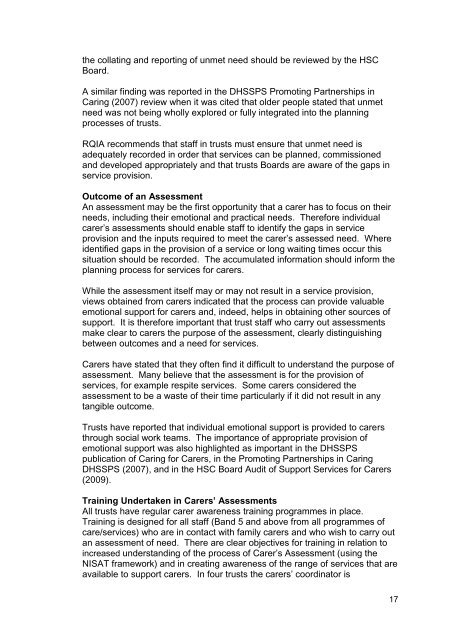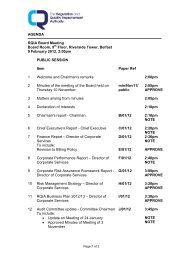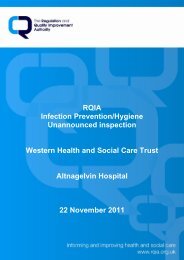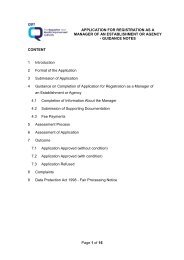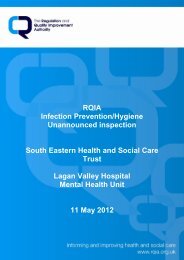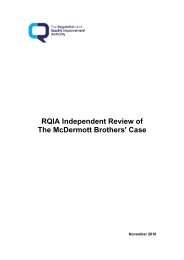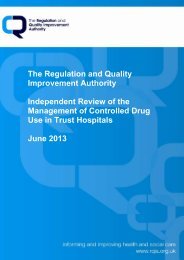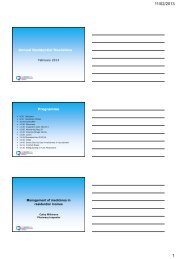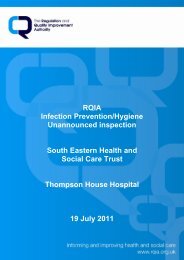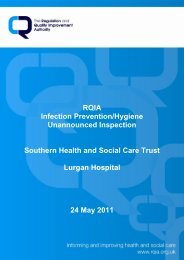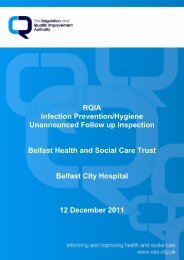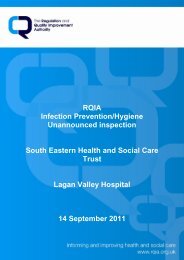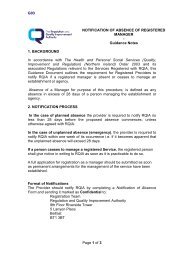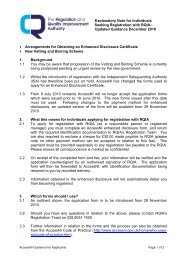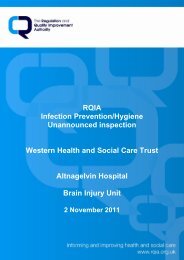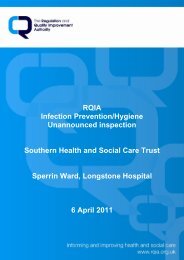Review of the Implementation of the Northern Ireland Single ...
Review of the Implementation of the Northern Ireland Single ...
Review of the Implementation of the Northern Ireland Single ...
You also want an ePaper? Increase the reach of your titles
YUMPU automatically turns print PDFs into web optimized ePapers that Google loves.
<strong>the</strong> collating and reporting <strong>of</strong> unmet need should be reviewed by <strong>the</strong> HSC<br />
Board.<br />
A similar finding was reported in <strong>the</strong> DHSSPS Promoting Partnerships in<br />
Caring (2007) review when it was cited that older people stated that unmet<br />
need was not being wholly explored or fully integrated into <strong>the</strong> planning<br />
processes <strong>of</strong> trusts.<br />
RQIA recommends that staff in trusts must ensure that unmet need is<br />
adequately recorded in order that services can be planned, commissioned<br />
and developed appropriately and that trusts Boards are aware <strong>of</strong> <strong>the</strong> gaps in<br />
service provision.<br />
Outcome <strong>of</strong> an Assessment<br />
An assessment may be <strong>the</strong> first opportunity that a carer has to focus on <strong>the</strong>ir<br />
needs, including <strong>the</strong>ir emotional and practical needs. Therefore individual<br />
carer‟s assessments should enable staff to identify <strong>the</strong> gaps in service<br />
provision and <strong>the</strong> inputs required to meet <strong>the</strong> carer‟s assessed need. Where<br />
identified gaps in <strong>the</strong> provision <strong>of</strong> a service or long waiting times occur this<br />
situation should be recorded. The accumulated information should inform <strong>the</strong><br />
planning process for services for carers.<br />
While <strong>the</strong> assessment itself may or may not result in a service provision,<br />
views obtained from carers indicated that <strong>the</strong> process can provide valuable<br />
emotional support for carers and, indeed, helps in obtaining o<strong>the</strong>r sources <strong>of</strong><br />
support. It is <strong>the</strong>refore important that trust staff who carry out assessments<br />
make clear to carers <strong>the</strong> purpose <strong>of</strong> <strong>the</strong> assessment, clearly distinguishing<br />
between outcomes and a need for services.<br />
Carers have stated that <strong>the</strong>y <strong>of</strong>ten find it difficult to understand <strong>the</strong> purpose <strong>of</strong><br />
assessment. Many believe that <strong>the</strong> assessment is for <strong>the</strong> provision <strong>of</strong><br />
services, for example respite services. Some carers considered <strong>the</strong><br />
assessment to be a waste <strong>of</strong> <strong>the</strong>ir time particularly if it did not result in any<br />
tangible outcome.<br />
Trusts have reported that individual emotional support is provided to carers<br />
through social work teams. The importance <strong>of</strong> appropriate provision <strong>of</strong><br />
emotional support was also highlighted as important in <strong>the</strong> DHSSPS<br />
publication <strong>of</strong> Caring for Carers, in <strong>the</strong> Promoting Partnerships in Caring<br />
DHSSPS (2007), and in <strong>the</strong> HSC Board Audit <strong>of</strong> Support Services for Carers<br />
(2009).<br />
Training Undertaken in Carers’ Assessments<br />
All trusts have regular carer awareness training programmes in place.<br />
Training is designed for all staff (Band 5 and above from all programmes <strong>of</strong><br />
care/services) who are in contact with family carers and who wish to carry out<br />
an assessment <strong>of</strong> need. There are clear objectives for training in relation to<br />
increased understanding <strong>of</strong> <strong>the</strong> process <strong>of</strong> Carer‟s Assessment (using <strong>the</strong><br />
NISAT framework) and in creating awareness <strong>of</strong> <strong>the</strong> range <strong>of</strong> services that are<br />
available to support carers. In four trusts <strong>the</strong> carers‟ coordinator is<br />
17


